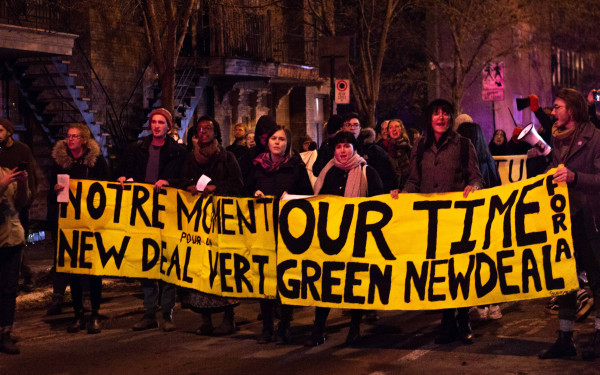Public Campaign to Garner Support for a Green New Deal in Canada Continues
A Green New Deal For All: Public Discussion with David Suzuki, Ellen Gabriel, and More
Last May, a small town hall on the Green New Deal took place on Concordia’s Loyola Campus.
On June 13, a similar but much larger event took place, featuring prominent environmental activists such as David Suzuki and Ellen Gabriel.
Whereas the town hall at Concordia’s Loyola campus had a soft tone that took the form of a discussion between private citizens, the second event was a much broader call for action—with activists continuing to lobby elected officials to adopt a GND.
Recently, the federal New Democratic Party adopted parts of the GND, encouraging people to keep pushing for more.
Akira De Carlos, a representative from student climate activist group La planète s’invite à l’Université said that there have been over 200 town halls across the country on the subject of a Green New Deal, with a “cross-country tour” to follow, to upkeep the pressure on federal politicians on a nation-wide scale.
De Carlos outlined what she considers to be the most important aspect of the GND: “climate justice.” She explained that, along with combating climate change and mitigating its effects, the GND would seek to address social and economic inequalities that have resulted from decades of capitalism.
“We can’t address climate change without addressing social justice because most people that [will be] impacted are marginalized communities–particularly the Indigenous communities,” she continued.
Elder Sedalia Kawennotas Fazio helped open the event by leading the audience in prayer.
“We as the human race would die if we lost one element on Mother Earth or in sky-world,” she said. “But if every single human being disappeared off of mother earth tomorrow morning, mother earth and sky-world would thrive.”
Her words illustrated the overall theme of the climate debate: We need the Earth, but the Earth does not need us.
Ellen Gabriel, a Mohawk activist and artist from Kanehsatà:ke Nation, Turtle Clan—most known for her involvement as the official spokesperson for the People of the Longhouse during the Oka Crisis in the 1990s—also spoke. She pointed out that the environment had long been a great focus of Indigenous thought, and that recognition of Indigenous thinking as legitimate is long-overdue.
“We don’t have long, and I think the marks set by the United Nations and other agencies are too kind for us,” she said.
“If we were to listen to Indigenous elders, we would have stopped this decades ago. The voices and the knowledge of our elders […] have long been unheard, and that wisdom has long been tossed to the side because of racism.”
Ecological academic and environmental activist David Suzuki delivered an impassioned speech both concerning climate change and the Green New Deal.
“The future […] is very uncertain,” he said. “What is or is not done in the next few years will determine whether we even survive as a species.”
When discussing the GND, he said that it offered a way to meet the targets set out in the Intergovernmental Panel on Climate Change (IPCC)’s 1.5 Degree Report and a way of providing security to the “weakest and poorest and most vulnerable among us” as well as creating employment for Canadians.
He said that due to overpopulation and the advancement of technology, we have entered an age in which humans have become “the dominant factor […] altering the physical, chemical and biological features of the planet” in what scientists have deemed “the Anthropocene Epoch.”
“We’ve invented an economic system […] based on the creed of cancer: growth forever. Are there no limits? How much is enough?” He asked.
Rather than our government agencies protecting the environment, he continued, our government agencies “protect the ability of humans to exploit” the environment.
Bianca Muygeni, an activist from The Leap (an organization dedicated to social and climate justice and one of the main organizations behind the event) delivered the final speech of the night. Her speech had a much larger sense of urgency combined with energetic delivery of her words compared to previous speakers.
“Are you ready for a Green New Deal?” She asked to thunderous applause.
“It’s time to pull at the roots of this crisis and treat it as an emergency because our house is on fire,” she continued.
She then emphasized the importance of accountability for those responsible for the climate crisis by having them pay for part of the GND through taxes, fines, and class-action lawsuits.
“Polluters have to pay,” she said, pointing out that 71 per cent of greenhouse gas emissions released into the atmosphere over the last few decades can be traced to 100 corporations.
At the close of her speech, she shifted her focus from criticism of the status quo to a passionate call for action.
“We have never needed a higher collective purpose project than we do right now,” she said. “The biggest obstacle to massive change in the fate of climate breakdown isn’t climate denial—it’s hopelessness.”
Her closing statement suggests that she believes that the crisis can be better addressed through activism than through nihilism.
“We will win a Green New Deal,” she concluded. “We will win it because we have to. We will win it from below and we will force our so-called leaders to follow. It’s time to make this planet our home.”






_600_375_90_s_c1.jpg)
